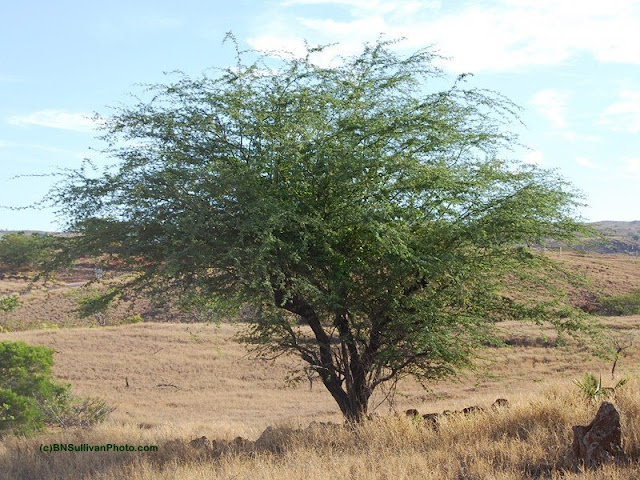Kiawe (Prosopis pallida)
Location: Kohala Coast, Big Island, Hawaii
Trees like this are a common sight in the area where we live, on the leeward side of Hawaii's Big Island. It is a Kiawe (Prosopis pallida), a hardwood tree native to South America.
All of the Kiawe trees in Hawaii are said to have descended from a single tree brought to Honolulu in 1828 by a Catholic priest called Father Bachelot. According to information about the Kiawe species on the USDA Forest Service website, the original tree planted by Father Bachelot first bore fruit in 1832, and by 1840, "progeny of the tree had become the principal shade trees of Honolulu and were already spreading to dry, leeward plains on all of the islands."
The Kiawe is a useful tree. For one thing, honeybees like the flowers of Kiawe trees, and Kiawe honey is very popular in the islands.
The tree bears seeds in long pods. Both the seeds and the pods are said to be high in protein. They can be ground up and used for animal fodder.
The sturdy hardwood is sometimes used for fence posts. Some local craftsmen even make furniture and objects like wooden trays from Kiawe. When polished, the wood has a beautiful grain. Kiawe, which is related to Mesquite, also is a popular firewood. It is used for making charcoal, as well.
But be careful if you walk, sit, or park your car beneath a Kiawe tree. Look carefully for branchlets that have fallen from the tree. The branchlets bear long, very sharp, very hard thorns that can readily pierce a shoe or a tire!
Update: Here is another photo of a Kiawe tree, near the ocean.

BNSullivan.jpg)
5 comments:
Very interesting Bobbie. It would appear to know all about this tree before you venture too close.
B.
That's an interesting history about how they came to populate from just one tree.
Thorns seem to come in a lot of good things. The good with the bad I suppose.
That tree is an antelope's favorite if I m not wrong
Interesting historical background to a lovely photo of the Kiawe tree.
Thanks, everyone.
@T and S Really? We have no antelope here in Hawaii, but perhaps antelope do like it elsewhere.
Bobbie
Post a Comment